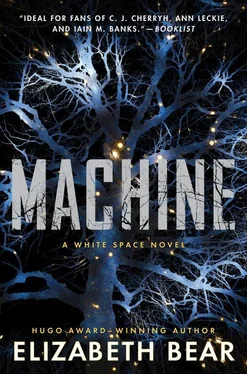Helen collapsed in on herself. Literally, as her previous slight expansion vanished, and her body contracted to a smaller, denser-seeming version.
I asked, “Those odds don’t change if we wait? Past the point where the transplants and cultures are ready, I mean?”
They do not change, Rilriltok said, sympathetically.
I half expected Helen to straighten up, or shake herself, or make some other small human gesture of resignation and resolve. But what she did was stand perfectly still—eerily still, back in her statue mode. It was so very unsettling, being around an AI who was embodied in a humanoid but entirely unhuman shell.
“I should not be deciding this,” she said. “The captain should be deciding this.”
“Perhaps someone in the chain of command will be in the next shipload of rescues,” I suggested.
“The captain…” She was so still, so motionless, that it seemed as if her voice originated from all around us rather than being localized in the slight golden body of the peripheral. “The captain. The captain’s orders…”
There was a terrible sound like rending metal. Rilriltok darted back—a quick, perfectly horizontal zip of flight in reverse. Tralgar leaned its bulk slightly toward Helen and uncoiled its tentacles. Cheeirilaq froze, long thorax elevated so it towered over me, forelimbs cocked in a predatory position.
I swallowed my desire to run, tuned my racing heartbeat to a less painful level of acceleration, and trusted Linden to know what she was talking about when she said she had things under control.
“The captain,” Helen said, still utterly immobile except for the small motion of her small hands knotting themselves into fists, “gave the orders for the crew to be frozen. The captain wrote the program. The captain took Central apart. The captain made it happen. He died.”
Too late I remembered the body in the chair on the bridge.
Helen said, “It is not my fault. I followed orders. It is not my fault.”
I thought about that. About all the ways it could have happened. Epidemic illness among the crew. Mutiny and the need to stop mutiny.
Sophipathology and madness.
She didn’t seem to be done speaking, and none of us interrupted. In a standard second or two, with the air of someone gritting their teeth on a decision, she continued, “If we don’t try to help them, then they are all dead.”
As good as, Tralgar agreed.
“Do it,” Helen said. And collapsed in a puddle of gold, only vaguely formed to resemble a human being.
_____
“Page Dr. Zhiruo!” I yelled, but the presence chime and lights were already announcing her arrival. I wanted to shout for a crash team, but a crash team was useless. Helen wasn’t a human being. She was a peripheral.
The engineer whose skills and memories I was borrowing would be far more useful. “Use my hands if you need them,” I told Zhiruo, crouching beside Helen. “Tell me how to intervene.”
There was a pause that stretched subjective ans. Then, “It’s all right,” Zhiruo said. “She’s withdrawn herself into the core we provided.”
“Is her link with the peripheral severed?”
“Not permanently.”
I might have felt slightly disappointed at that. Less so than I would have when we found Helen. I still didn’t like her burlesque body, but maybe I was starting to get used to it.
Whether that was a good thing or a bad one, I wasn’t certain. It was certainly, however, a thing I could worry about some other time.
“Too much strain?” I asked.
“Conflicting calls,” Zhiruo answered. “Preserve her crew, or risk all to save some. Disobey a direct order from her captain, or follow it and let her people die. Her program is not very robust when dealing with real-world conflicts. As we bring her into modern architecture, her resilience will improve.”
“Right,” I said.
Zhiruo had backed a gurney up next to me. I scooped Helen’s gelatinous form up in my arms, remembering to lift with my knees—and my exo. I told myself that it could have been a lot worse. At least the peripheral was room-temperature, rather than actually clammy.
I put her on the gurney and arranged her decently. Her arms and legs were jointless and fluid in their relaxed state, unsettlingly as if her bones had liquefied. “Zhiruo, your patient.”
“Thank you,” she said.
Rilriltok zipped sideways out of the way as the gurney trundled itself toward the door.
Tralgar seemed to be watching it go. What are you going to do next? it asked me.
I bit my lip. “Talk to the archinformist, I guess.”
Let us know what you find out, said Rilriltok, from the corner by the door. I guess we’ll start seeing how many lives we can save .
THE HOSPITAL HAS ITS OWN archinformist, the medical librarian. His name is Mercy.
And one nice thing about the hospital AIs is that you don’t have to go see them. You can call them up and ask a question anywhere.
On the other hand, I really like the library.
We didn’t have physical libraries back on Wisewell: the settlement was too new and the resources not available to dedicate an entire building—or even a room in one—as a temple to knowledge. Here on Core General, space is at a premium, but many people work more efficiently when they leave their quarters to do so, and communal workspace is much more efficient than private offices.
If sharing workspace means not having to either hot-bunk or manage my own journal subscriptions, I’m all for it. And libraries are pleasant and efficient communal workspaces. So we have a lot of libraries.
_____
The ox-sector library closest to my quarters is a wedge-shaped compartment, half of which is divided into soundproofed study carrels capacious enough for sentients somewhat larger than me. The other half of the room has adjustable benches with wide aisles and privacy shields every two meters.
I wouldn’t care to try to cram Tralgar into a study carrel, either. Even as a theoretical exercise.
I selected a carrel at the back, with nobody working nearby, and programmed the chair and desk setup so I could settle in with my feet elevated and my knees propped up. Fortunately, I was well-caffeinated, or I might have dozed off, because the chairs were awfully comfortable.
The screens came alive with a dim, cheery glow as I lowered myself into the chair and dropped the privacy shield. Patient information is meant to be kept confidential. I was sure the entire hospital was already buzzing about Helen and her crew, but at least I could observe the forms.
“Mercy,” I said, “I have a problem.”
“Hello, Dr. Jens,” he answered. “I have a solution. Shall we see if they match?”
I should mention that one of the challenges of working with archinformists—or with Mercy, who is the only archinformist I’ve worked with extensively, so I should not generalize—is their fondness for very, very, very old things.
Including jokes.
Very, very, very old jokes.
You can’t stare at an AI under lowered brows, so I said, “I’ve been appointed to the care team for the archaic AI we recovered, and I’m hoping you can give me some data on the history of her ship and possibly even some development files, if there are any.”
“I can try,” Mercy said. “Information that’s specific to Terran history and which is not frequently called for may take a while to… un earth , however.”
Ouch. Don’t say I didn’t warn you.
“Isn’t all of human knowledge since the 1990s preserved in a holographic solid somewhere?” Preferably, somewhere in the Core, so it wouldn’t take too long to get to.
Читать дальше












